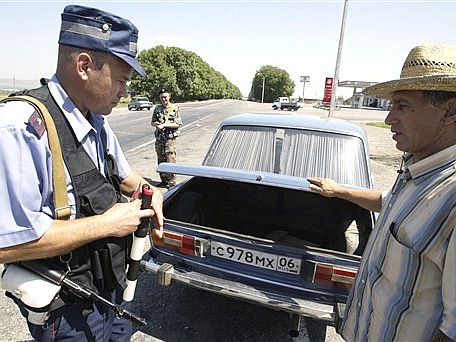
Moscow Puts Rights Groups in North Caucasus in ‘Mortal Danger’
Publication: Eurasia Daily Monitor Volume: 10 Issue: 16
By:

The Russian government’s requirement that human rights organizations receiving financial assistance from abroad register as foreign agents and the unwillingness of Russian businessmen to cross the Kremlin by making up the shortfalls is hurting human rights groups across the country. But in the North Caucasus, activists say, Moscow’s policies are putting those who work for human rights and report on violations there in “mortal danger.” On the one hand, that will mean that there will be less reliable information about what is occurring in that volatile region. And on the other, it will open the door to still more repressive behavior by regional officials who will no longer have to worry that their actions will be monitored by such groups.
While many activists in the North Caucasus say they will continue to work even as they seek funding from other sources, the majority appear to share the view of Igor Kalyapin, who said that registering as a foreign agent in other parts of the Russian Federation may be insulting but that doing so in the North Caucasus constitutes “a serious risk to the lives” of any forced to do so. “In Chechnya,” he pointed out, “people are constantly disappearing. Human rights organizations that take up a problem and receive ‘the black mark’ of a foreign agent will not simply be forced to close; no one will ever see their co-workers again” (www.kavkaz-uzel.ru/articles/219077/).
But more immediately, human rights organizations in the North Caucasus are threatened with a loss of funds if they can no longer accept assistance from abroad without risks. Anatoly Kucherin, a member of the Russian Social Chamber, said he does not see that as a major problem because most human rights activists predominantly work as volunteers. But Valentina Melnikova, the head of the Russian Research Center on Human Rights, an umbrella organization that unites ten prominent Russian rights groups, believes that branches of these organizations in the North Caucasus and the Southern Federal District now may be forced to close.
These organizations mostly need money to pay rent and other expenses related to their offices. Their lawyers and activists work pro bono or for minimal amounts, but without money, they cannot maintain their physical presence. Some have tried to operate in Chechnya without a fixed office or fixed employees, but that is difficult and could by itself invite even more official pressure on these groups. Yet, given the risks of registering as a foreign agent for organizations operating in the North Caucasus, she said, her groups will not register as “foreign agents” because “we do not get involved in politics” (www.kavkaz-uzel.ru/articles/219077/).
Lyudmila Alekseyeva, the longtime head of the Moscow Helsinki Group, noted that those who say NGOs in Russia can turn to business for help do not understand the situation: “There is simply no independent business” in the country. Consequently, “businessmen are afraid to invest in human rights since this will not please the administration of the president of the Russian Federation or the governor of a region.” If that happens, “not only will the business suffer, but its owner may even lose his freedom” (wordyou.ru/v-rossii/biznes-boitsya-finansirovat-kavkazskie-nko.html).
Maksim Shevchenko, a member of the Presidential Council of Human Rights, disagrees. He argued that “human rights activists have not found financing in Russian business because they have not done a good job of looking for it.” Moreover, he said, in words that most others in this area would reject at least for the North Caucasus, “nothing terrible will happen if they indicate that they do receive financing from abroad.” Anton Ryzhkov, who operates the mobile group of the Committee Against Torture in Chechnya, suggested that such a view is naïve. “The epithet ‘foreign agent’ could be taken too literally in the Chechen Republic, and that alone would threaten the NGO with serious problems” (wordyou.ru/v-rossii/biznes-boitsya-finansirovat-kavkazskie-nko.html).
In addition to his group’s approach of using a mobile group rather than maintaining an office in Chechnya, Ryzhkov continued, there is another tactic his organizations and others like it appear set to adopt: Businesses are prepared to provide financing for groups that are investigating past events such as the Chechen war. And their financing of that kind of research could allow the groups to use other money in order to focus on their primary task: the investigation of “‘fresh’ cases of kidnapping.” But such a combination is likely to be too much for many Russian businesses and regional governments.
For all these reasons, the future of human rights activity in the North Caucasus is not bright unless the Russian law is changed. The first victims of these cutbacks, of course, will be the people in that troubled region. But others will suffer as well, including outside observers who want to know what is happening. Without the reporting that these human rights groups regularly provide, that is going to be a far more difficult task.




